
Proven strategies for success in sales technical training encompass comprehensive skill development that integrates both hard and soft skills, alongside the incorporation of technology and continuous learning methodologies. Effective training programs are essential as they enhance product knowledge, communication abilities, and the adept use of modern tools. This leads to improved sales performance and heightened customer satisfaction in an increasingly competitive market. Organizations must recognize that investing in such training is not merely beneficial; it is imperative for sustained success.
In the competitive realm of technical sales, the significance of specialized training is paramount. As the landscape evolves, sales professionals must possess a profound understanding of product specifications, industry standards, and the nuanced needs of their customers. This article explores the essential components of sales technical training, illustrating how it empowers teams to communicate complex information effectively and adapt to modern tools, such as social media and AI.
By investing in comprehensive training programs, organizations can significantly enhance their sales capabilities, boost productivity, and drive notable improvements in performance and customer satisfaction. As the industry shifts toward continuous learning and innovation, grasping the methodologies and technologies that underpin successful sales training will be critical for professionals aspiring to excel in this dynamic environment.
Sales technical training is indispensable for professionals in technical commerce settings, where a profound comprehension of product specifications, industry standards, and client requirements is crucial. This program not only enhances product understanding but also empowers teams to convey intricate information clearly and convincingly to clients. In 2025, the landscape of commercial education is evolving, with a significant trend indicating that 56% of professionals in the field utilize social media to discover new prospects. This underscores the necessity for education that incorporates contemporary tools and methods, such as social media tactics, to effectively connect with potential clients.
Investing in comprehensive development programs, like the Solution Selling – Module 2 offered by Magical Selling for $149.00, is essential for organizations aiming to equip their sales teams with the skills required to thrive in a competitive market. This module emphasizes value selling strategies, balancing positive outcomes with consequences for effective buyer engagement. Studies indicate that vendors achieve 44% greater success in reaching their targets when supervisors provide feedback during instruction. This highlights the importance of structured support in the learning process, as it directly correlates with enhanced performance.
Moreover, leading performers are 63% more inclined to successfully communicate robust ROI and financial arguments to purchasers, illustrating how specialized instruction enhances these critical communication abilities. The Seller Dimension framework incorporated in the instruction emphasizes deal creation, progression, and closure, addressing pressing challenges such as quota management and market competition. This framework integrates tailored methodologies and strategies that enrich the educational experience. Case studies reveal that personal productivity habits significantly influence performance in selling.
Effective development programs cultivate these productivity habits, enabling top performers to focus on high-impact activities that yield superior results. As organizations prioritize sales technical training for their teams, they not only enhance their capabilities but also promote improved sales results and customer satisfaction. The advantages of extensive training programs for professionals are clear: they foster a culture of continuous improvement and equip individuals with the resources necessary to excel in today's dynamic commercial environment.
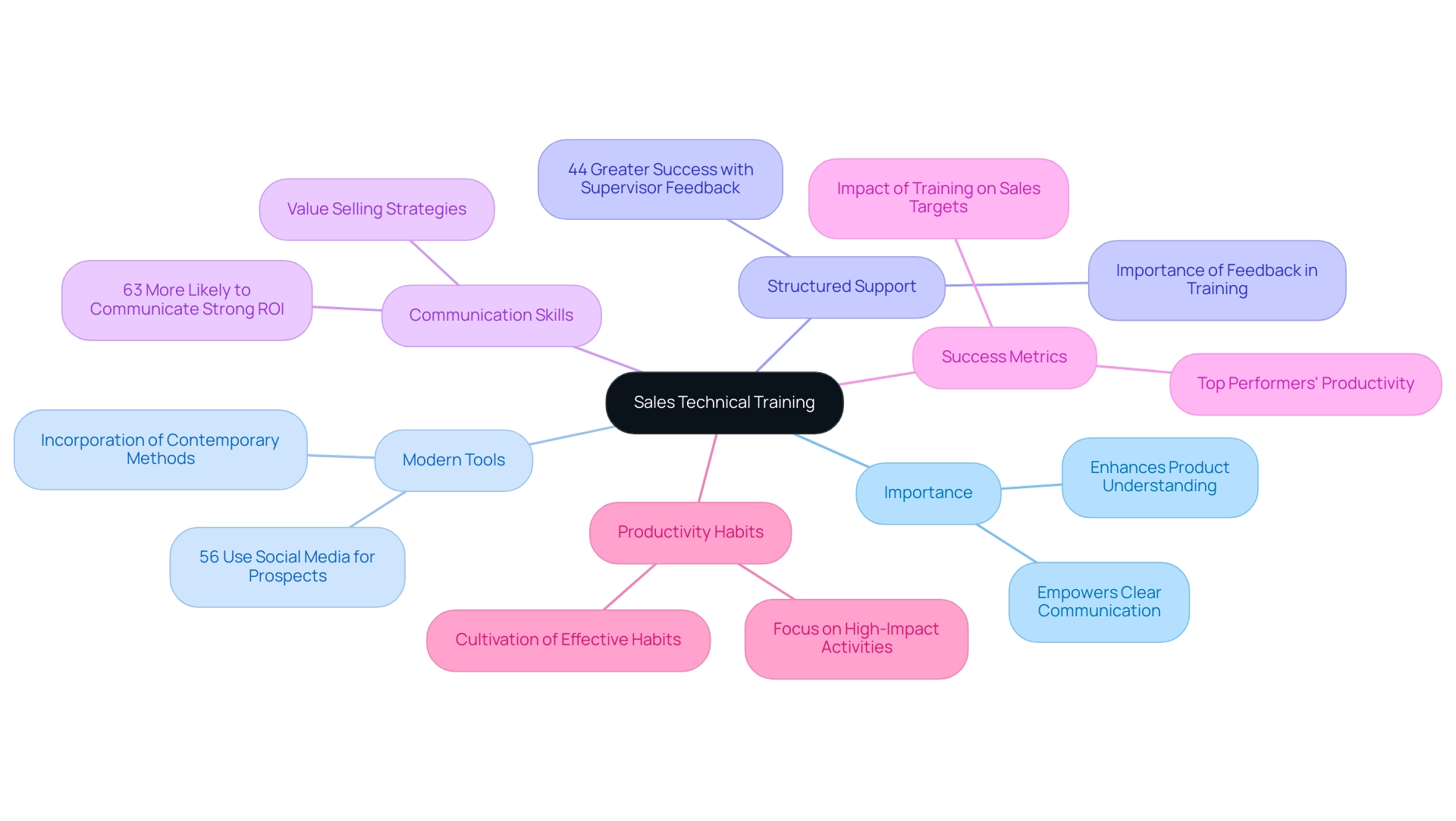
To excel in technical selling positions, professionals must cultivate a robust blend of hard and soft skills. Essential hard skills include:
These competencies empower professionals to demonstrate product value effectively and customize solutions to meet client needs, particularly in the Age of the Alternatives, where articulating value is crucial for negotiating against direct competitors and disruptors.
Equally critical are soft skills, encompassing:
These interpersonal abilities foster trust and rapport with clients, facilitating a deeper understanding of their challenges and requirements. Indeed, studies indicate that sales experts thriving in social selling are 51% more likely to achieve their quotas, and 61% of companies engaged in social selling report revenue growth, underscoring the importance of these abilities in the current market.
The commercial landscape in 2025 necessitates ongoing dedication to skill enhancement. Sales technical training programs focusing on both hard and soft skills are vital for maintaining a competitive edge. For instance, organizations adopting omnichannel marketing strategies—now implemented by 80% of companies—have experienced enhanced customer engagement and improved revenue outcomes.
This shift highlights the necessity for professionals to adapt and refine their skill sets in response to evolving market dynamics, including the strategic selection of high-value projects based on readiness and willingness.
Moreover, statistics reveal that 53% of marketers find inbound marketing yields a higher ROI compared to outbound methods, emphasizing the need for teams to be adept in both traditional and digital approaches. Additionally, high-performing sales experts are over 2x as likely to leverage AI to guide their efforts, illustrating the growing role of technology in achieving success. As the commercial landscape continues to evolve, continuous education and sales technical training will be essential for professionals seeking lasting success in their technical selling careers, particularly in comprehending and classifying objections to maintain tactical flexibility.
The three categories of objections—price, product, and process—are crucial for professionals in commerce to navigate effectively. At Magical Selling, we highlight the significance of these categories in our development programs, ensuring that our teams are prepared to manage objections with agility and expertise.
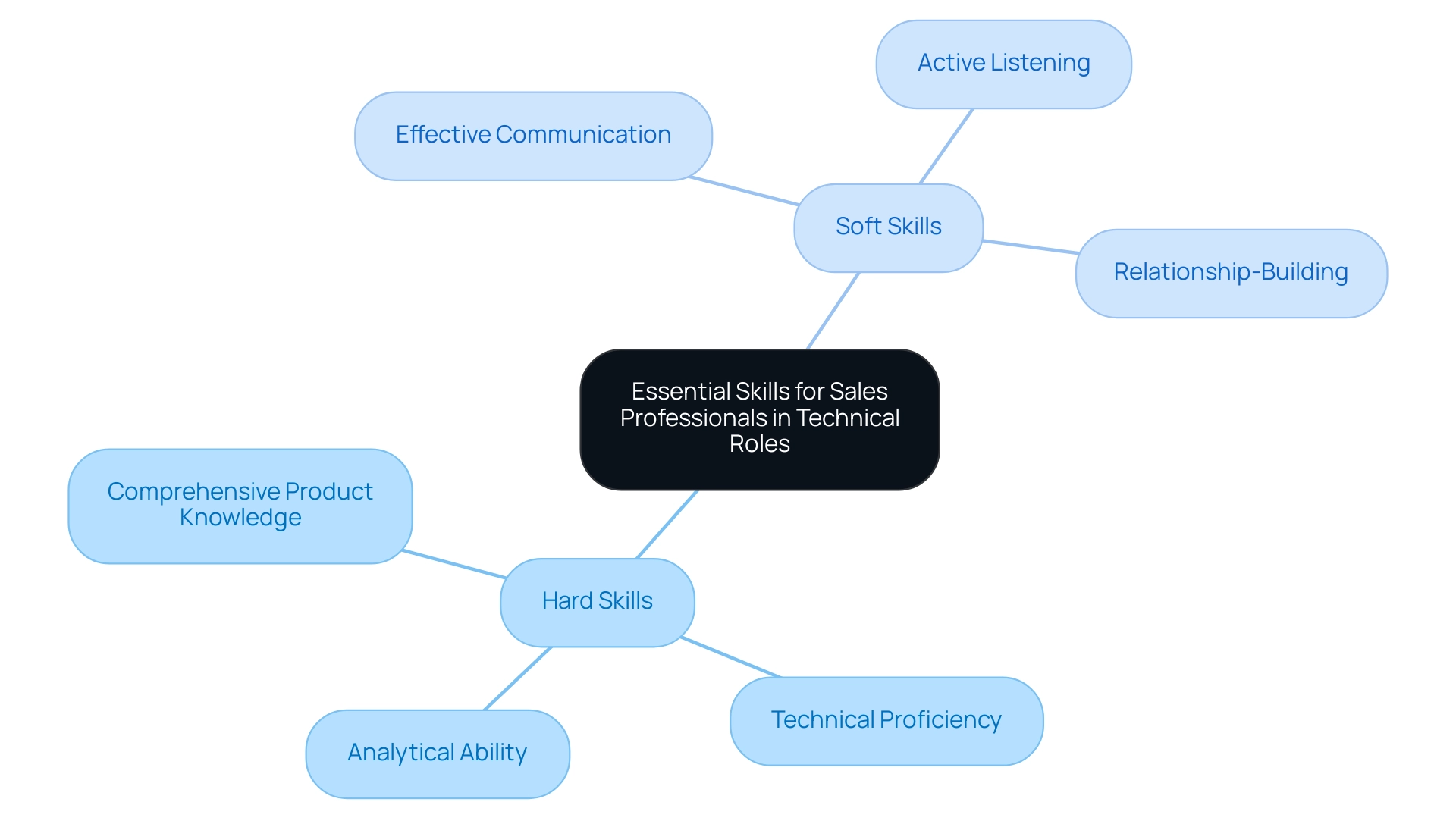
Effective development methodologies for commercial success encompass a blend of traditional and innovative strategies, including sales technical training, designed to maximize the potential of sales experts. One of the most impactful approaches is the use of role-playing exercises, which simulate real-life marketing scenarios in a controlled environment. This method not only boosts confidence but also hones essential skills, allowing participants to navigate complex interactions with ease.
Research indicates that organizations implementing role-playing in their development programs see significant improvements in performance, with success rates soaring as high as 70% in some cases.
Alongside role-playing, the incorporation of e-learning platforms has transformed sales technical training. These platforms provide flexible, on-demand resources customized for various learning styles, allowing professionals to engage with content at their own pace. This adaptability is crucial in today’s fast-paced environment, where sales technical training is vital for staying competitive.
Notably, participants in leadership development can experience a 28% increase in leadership behaviors, highlighting the effectiveness of structured learning pathways that can also be applied to sales technical training.
To ensure that sales technical training programs meet their objectives, incorporating robust feedback mechanisms and assessments is essential. These tools not only facilitate the measurement of learning outcomes but also promote a culture of continuous improvement within organizations. A case study titled "What Role Does Continuous Education Play in Leadership Development?" emphasizes that ongoing education enhances individual capabilities and fosters a learning-oriented culture, ultimately driving innovation and success. This is especially pertinent for commercial teams, where sales technical training can foster continuous learning, leading to enhanced performance and adaptability.
Moreover, the MAGICSales methodology emphasizes consultative selling techniques, which focus on establishing credibility and effectively addressing client needs. By mastering these techniques, professionals can better navigate objections and present solutions that resonate with their audience. The compatibility assessment for representatives, managers, and leaders is a vital element of this methodology, ensuring that the appropriate strategies are applied to the right individuals.
In the context of remote sales teams, offering fringe benefits can be a strategic approach to retain and attract top talent, ensuring that organizations have the best professionals equipped with the necessary skills. Furthermore, the statistic that 34% of employees acknowledge skimming through compliance information highlights the importance of effective content delivery in educational programs. Engaging instructional methodologies are essential to capture attention and ensure that critical information is retained.
By utilizing these efficient instructional approaches, such as consultative selling and strong feedback systems, companies can enhance their personnel's capabilities through sales technical training to attain extraordinary outcomes, adjusting to the changing requirements of the market while improving their overall performance. For those encountering challenges in revenue targets, market competition, or talent acquisition, we encourage you to reach out to Magical Selling for customized solutions.
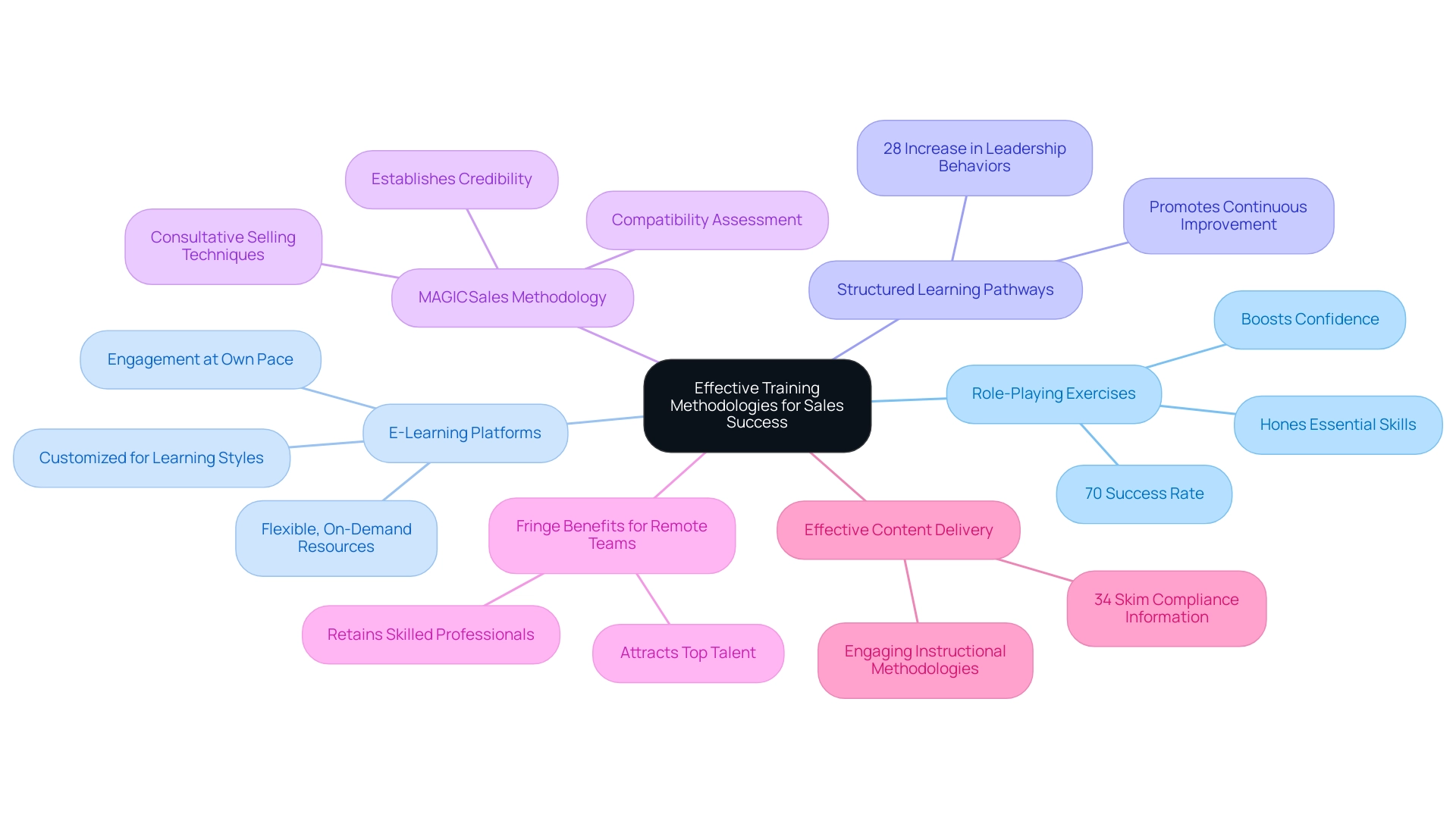
Technology stands as a cornerstone in enhancing the outcomes of sales technical training, fundamentally transforming how businesses prepare their sales teams for success. Learning Management Systems (LMS) have emerged as essential tools, enabling organizations to deliver educational content efficiently while meticulously tracking progress. By 2025, the integration of LMS in sales development has shown a substantial improvement in effectiveness, with companies reporting enhanced engagement and retention rates among sales professionals.
Moreover, the implementation of customized frameworks, such as the Heart of the Deal Method and the Problem Statement Method, is reshaping the instructional landscape. These strategies allow professionals to engage in realistic transaction scenarios, honing their skills within a controlled environment. This practical approach not only boosts confidence but also equips teams to navigate complex customer interactions with efficiency.
Statistics reveal that 87% of sales professionals recognize the importance of face-to-face relationships with clients, underscoring the need for development that fosters interpersonal skills. However, a staggering 86% of business purchasers prefer representatives who comprehend their objectives, yet only 59% believe that most reps have received adequate sales technical training to fulfill this expectation. This disparity highlights the critical need for targeted development that leverages sales technical training and technology to bridge the gap between sales teams and customer demands.
The impact of technology on sales education is further illustrated by a recent case study on Pods Asia's Sales-as-a-Service solutions within the hospitality sector. They successfully secured 17 new logos across two countries in two quarters, demonstrating how effective development and strategic frameworks can lead to rapid client acquisition and market expansion. Successful strategies in this domain encompass high-volume prospecting and adaptive pitches, bolstered by CRM tools that enhance tracking and refine approaches.
This blend of traditional and modern techniques illustrates how technology can elevate conventional marketing strategies, resulting in significant annual revenue generation.
As organizations continue to embrace technology in their development programs, the benefits of sales technical training and related tools become increasingly evident. Businesses investing in these technologies not only improve their sales technical training efficiency but also empower their workforce to achieve better results. In fact, 43% of professionals now utilize intelligence tools for tracking and managing their pipelines, reflecting a 54% increase from just two years ago.
Furthermore, 81% of sales teams are investing in AI, which offers advantages such as improved data quality and personalized customer interactions. This trend signifies a growing recognition of the value that technology brings to training and performance management.
To further enhance selling skills and address the challenges faced by professionals in this field, the Sales Gym membership provides tailored frameworks and a system of plays and high-value artifacts. This membership facilitates deal creation, progression, and closing, ensuring that sales teams are well-prepared to meet the demands of a competitive market.
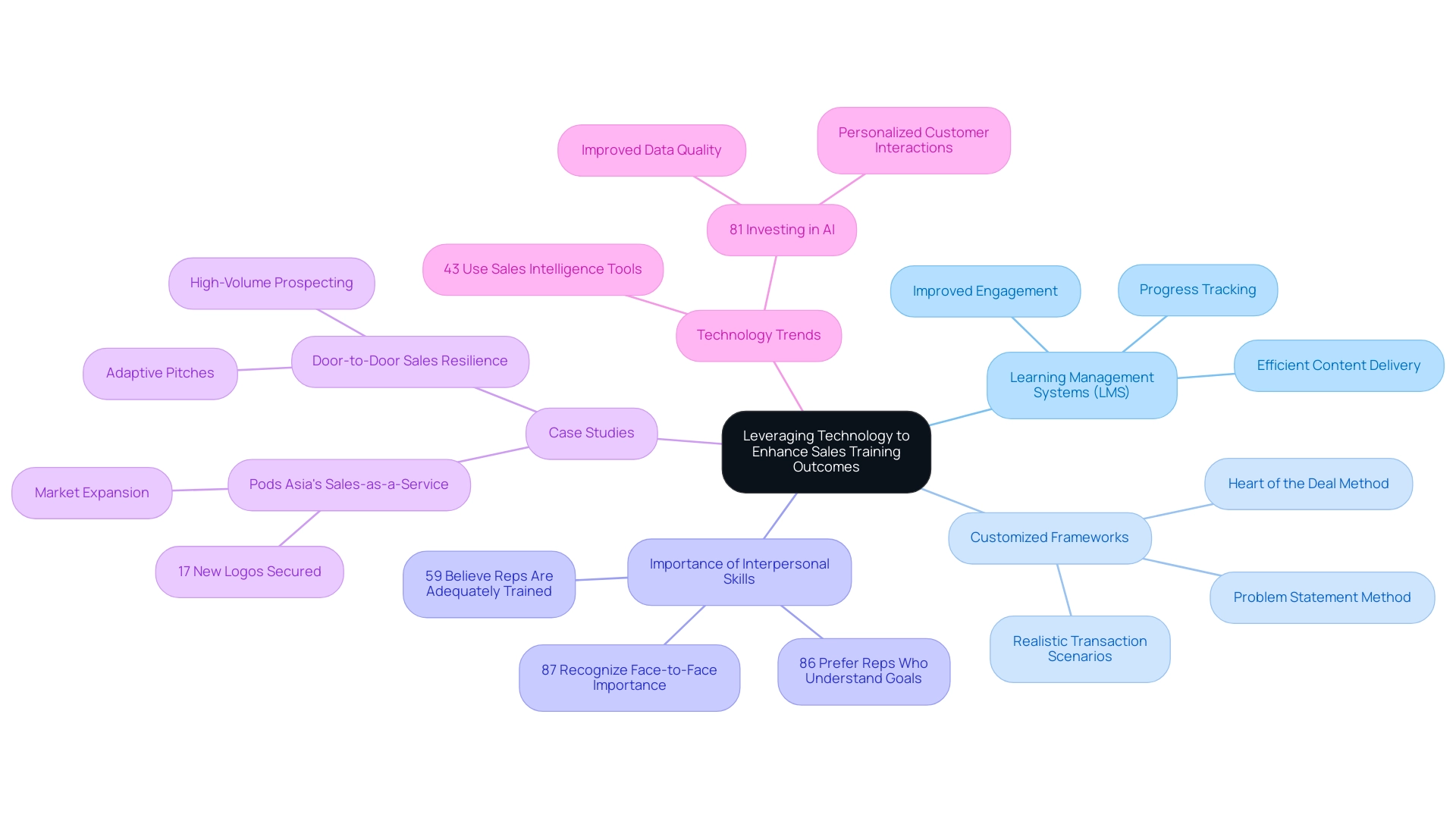
In the dynamic environment of commerce, the necessity for continuous learning transcends mere advantage; it has become a fundamental requirement. To maintain their effectiveness, sales professionals must remain informed about evolving industry trends, innovative products, and shifting customer preferences—essential components of their sales technical training. Organizations can foster a strong culture of ongoing learning by:
At Magical Selling, we recognize the urgent challenges faced by revenue teams, including:
Our customized marketing strategies and development programs are specifically designed for startups and enterprises, directly addressing these pressing needs. Research indicates that companies prioritizing continuous development experience significant improvements in performance and revenue.
For instance, companies investing in tailored development programs report enhanced revenue outcomes and reduced turnover rates, effectively mitigating issues stemming from inadequate training.
Notably, a recent study revealed that 81% of sales teams are now incorporating AI into their training processes, which not only enhances data quality but also fosters personalized customer interactions. To effectively cultivate a culture of continuous learning within sales teams, organizations must focus on creating an environment that values growth and development. This can be accomplished by encouraging team members to share insights and experiences, thereby enriching the collective knowledge base.
Moreover, ongoing education should be embedded into the organizational culture, extending beyond initial onboarding to ensure that learning is a continuous journey. As one expert aptly stated, "That’s why I can’t stress enough the importance of going beyond initial onboarding and firmly ingraining ongoing growth into the fabric of your culture."
Looking ahead to 2025, the integration of both analog and digital methods in education will be crucial. Companies that blend these approaches while leveraging real-time data will equip their teams with the essential tools to thrive. The emphasis on ongoing education, including sales technical training, not only enhances individual skills but also propels overall organizational success, making it a vital component of effective sales development strategies.
By soliciting customer feedback on our educational modules, such as the 'Net Neutral Account – Module 7', we ensure that our offerings are continuously refined and aligned with the needs of our clients.
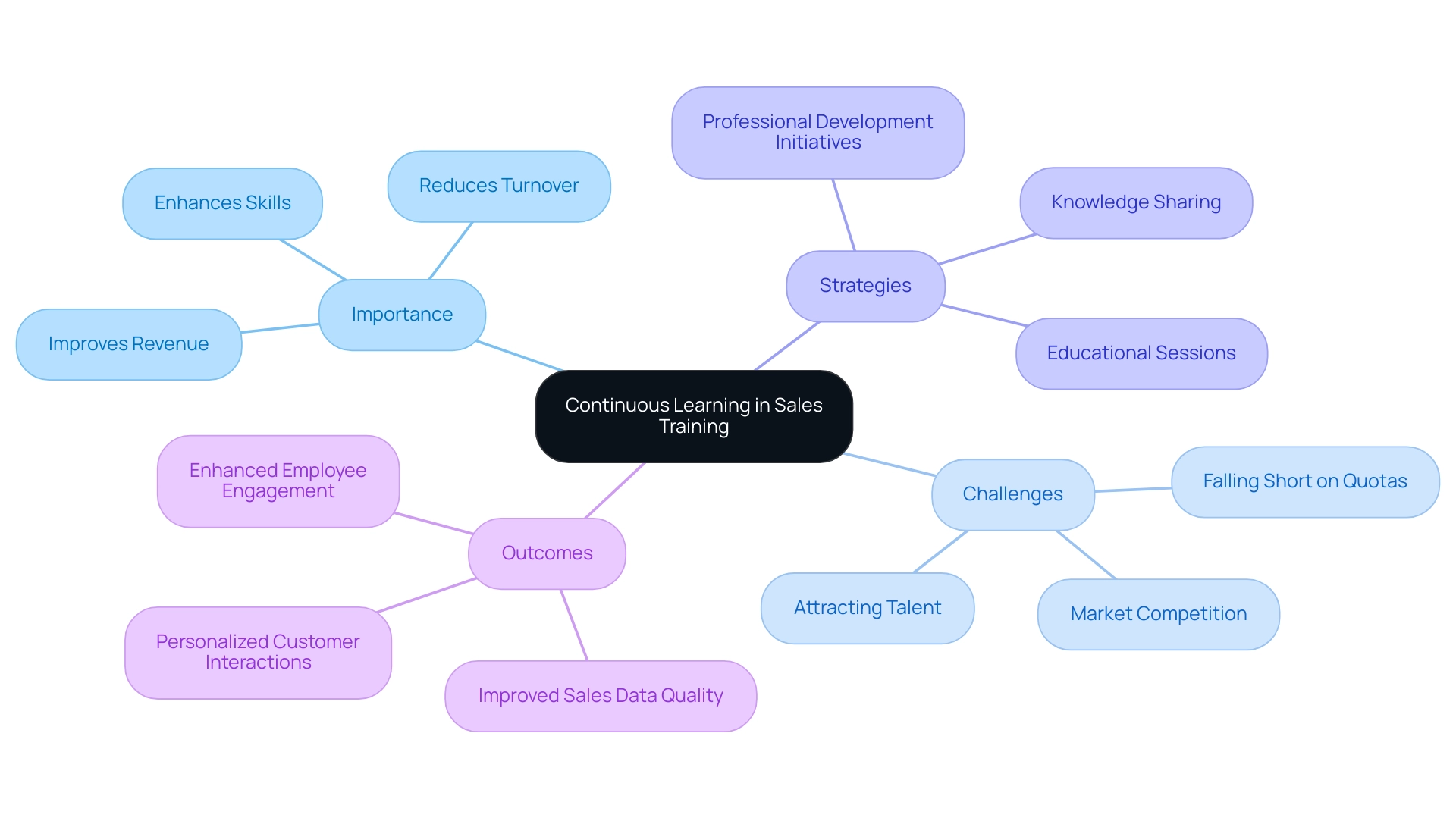
Assessing the success of revenue development initiatives is essential for companies aiming to enhance their sales efficiency through effective sales technical training. Key performance metrics, including sales revenue, win rates, and customer satisfaction scores, serve as vital indicators of the impact of sales technical training. To systematically evaluate the effectiveness of educational programs, organizations can utilize the Kirkpatrick Model, which assesses outcomes across four levels: participant satisfaction, learning, behavior change, and business impact.
This comprehensive approach enables organizations to gauge not only how effectively participants absorbed the instruction but also how it translates into tangible business outcomes.
Regularly evaluating these metrics is crucial for refining educational programs to ensure alignment with overarching business goals. For instance, organizations that implement robust sales development initiatives, such as those offered by Magical Selling, frequently experience a significant increase in revenue. Magical Selling's tailored GTM and Sales-as-a-Service solutions have proven instrumental in assisting clients, such as Pods Asia, in securing 17 new logos within just two quarters, culminating in a revenue growth of 28%.
This underscores how the techniques employed by Magical Selling directly lead to successful results.
Moreover, win rates can improve as teams become more adept at applying learned methodologies in real-world scenarios. Additionally, customer satisfaction ratings often reflect the quality of interactions, which can be enhanced through targeted development programs. A case study reveals that 62% of college graduates prioritize companies that provide comprehensive development, highlighting the significance of quality instruction not only for performance but also for attracting top talent.
Insufficient development can lead to high turnover, inconsistent selling methodologies, diminished confidence among representatives, and subpar performance, thereby emphasizing the necessity for structured sales technical training programs. Furthermore, incorporating the statistic regarding annual contract value (ACV) can illustrate the financial impacts of effective sales instruction, as companies with well-prepared teams are likely to secure higher contract values. By employing the Kirkpatrick Model and focusing on these essential metrics, organizations can ensure their sales development programs yield quantifiable outcomes and foster a culture of continuous improvement.
Additionally, examining recognized leading content management systems for 2025 can provide valuable tools that organizations can leverage to enhance their sales development efforts, aligning with best practices in the industry. For any inquiries regarding our development programs, please consult our FAQs, which address common concerns and provide further information on how Magical Selling can support your transformation journey.
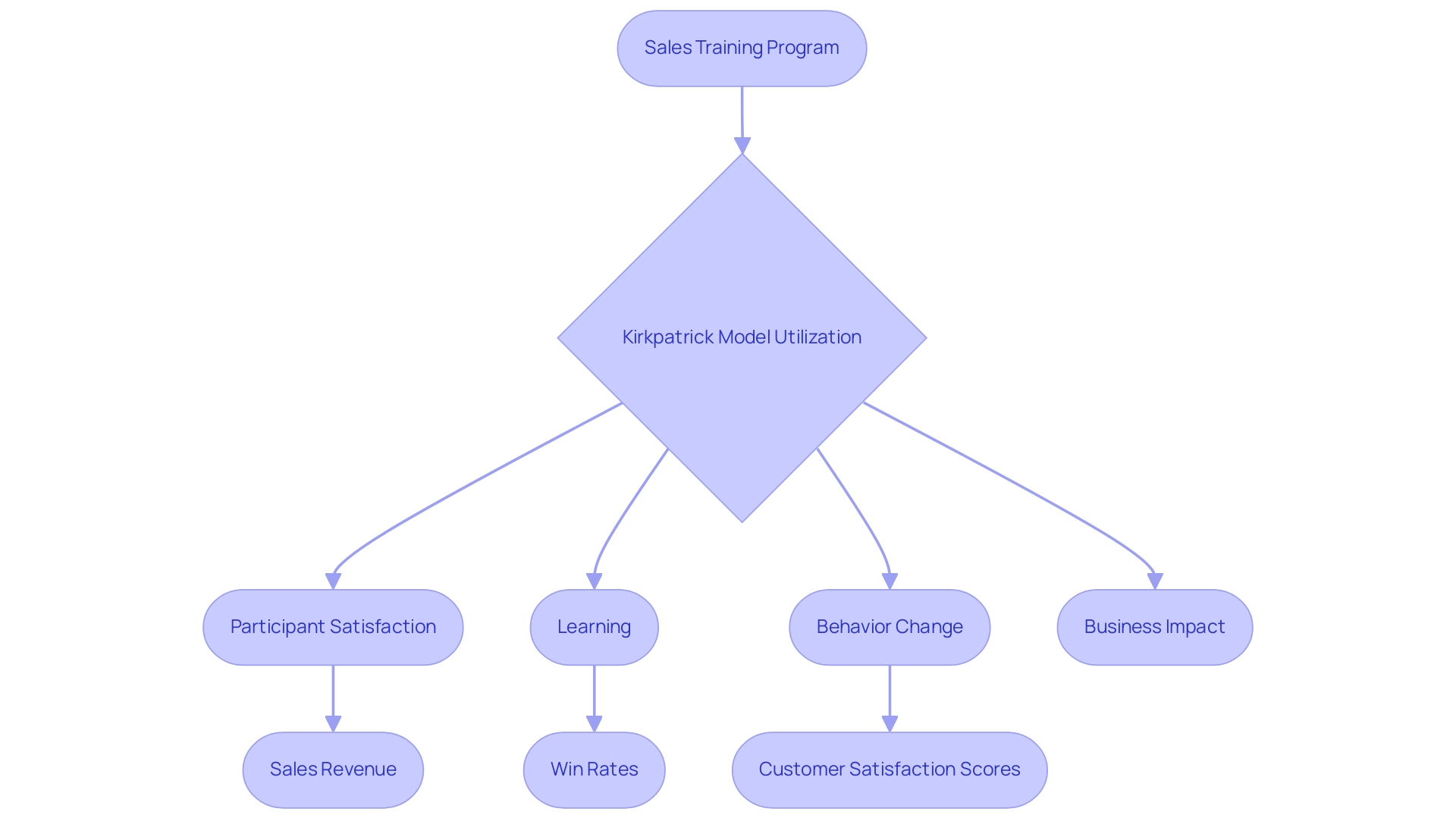
As the commercial environment continues to evolve, organizations must proactively prepare for advancements in technical education. A significant trend is the increasing integration of artificial intelligence (AI), projected to enhance the personalization of education. Notably, 81% of sales groups are investing in AI to improve data quality and foster personalized interactions, ensuring that education remains relevant and impactful.
Moreover, the global D2D market is anticipated to grow at an annual rate of 6.4% through 2030, underscoring the necessity of adapting education to meet market demands. The emergence of hybrid training models—blending in-person and virtual learning—provides flexibility and accessibility, catering to diverse learning preferences. This approach not only accommodates the varying schedules of professionals but also cultivates a more engaging learning environment.
In addition, there is a growing emphasis on developing soft skills, which are crucial for navigating complex processes. With an average of seven individuals involved in B2B purchasing decisions, and buyers completing 57% to 70% of their research prior to making contact, equipping teams with strong interpersonal skills is essential for success. Gong observes that leaders who instruct their representatives to initiate cold calls with the question, 'How've you been?' experience a 6.6% increase in rep success rates, highlighting the significance of personal engagement.
To further enhance effectiveness, organizations can leverage customized frameworks and strategies such as the Heart of the Deal Method and the Problem Statement Method, which emphasize deal creation, progression, and closing. These frameworks equip teams with the necessary resources to navigate competitive environments efficiently, whether they are the innovators or those affected.
Looking ahead to 2025, continuous and customized development will be vital for building proficient teams. Organizations that prioritize ongoing education and tailored learning experiences through sales technical training are likely to see substantial improvements in sales outcomes and revenue. For instance, entities that adjust their development approaches to incorporate AI-driven customization are better positioned to meet the demands of a competitive market.
Additionally, the typical B2B selling process required 25% more time in 2024 compared to five years earlier, emphasizing the need for efficient training in a dynamic selling environment. In conclusion, by remaining attuned to these trends and adjusting training programs accordingly, organizations can ensure their workforce is equipped to thrive in a constantly evolving market, ultimately fostering sustainable growth and success. Magical Selling's Sales Gym membership offers tailored frameworks and strategies to empower sales teams in this dynamic environment, ensuring they are well-prepared to face competitors and achieve their objectives.
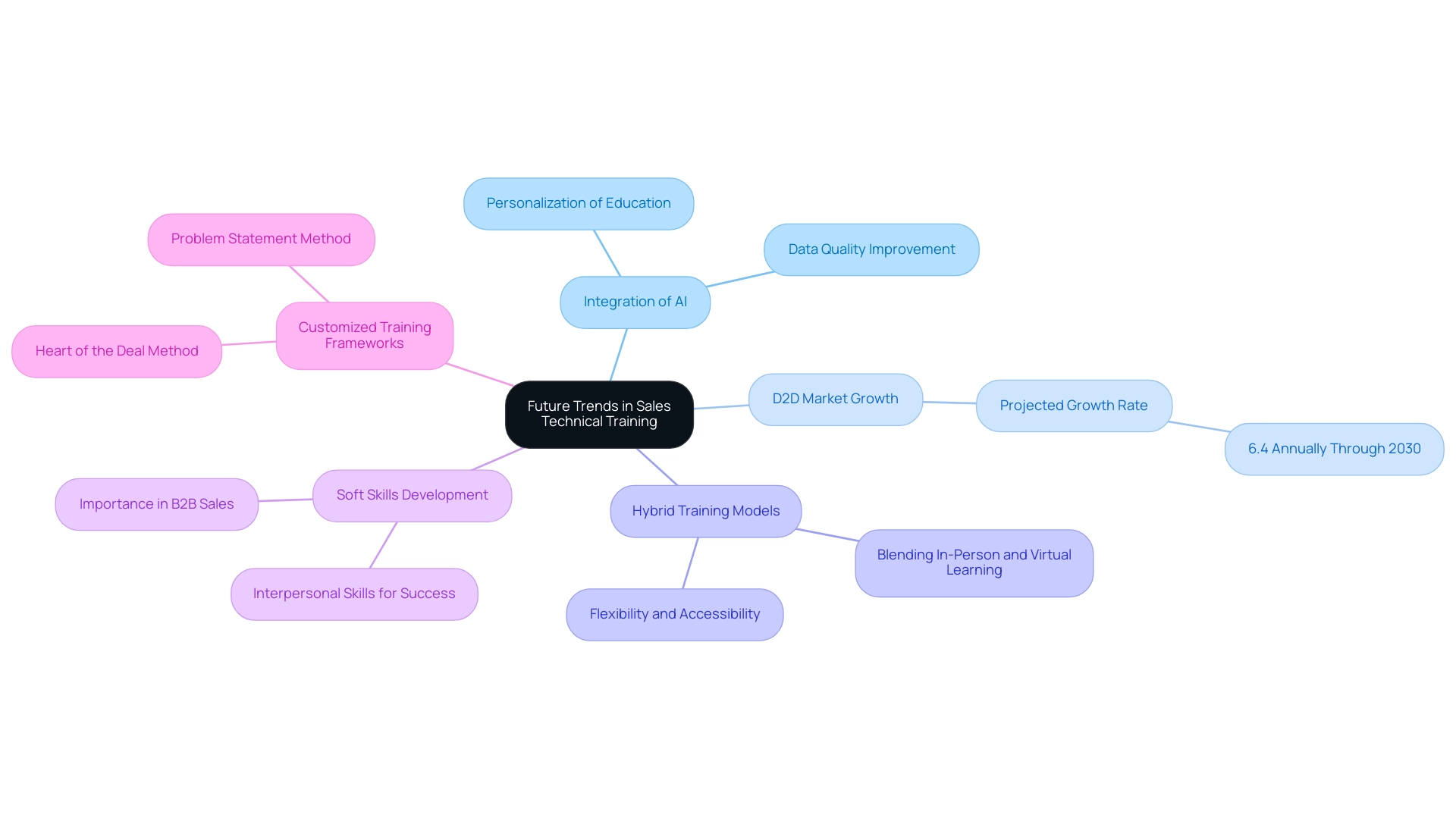
Investing in specialized sales technical training is not merely an option; it is an essential strategy for organizations aiming to excel in the competitive landscape of 2025 and beyond. This article underscores the multifaceted benefits of such training, highlighting the critical importance of equipping sales professionals with both hard and soft skills. Mastery of product specifications and industry standards, combined with effective communication and relationship-building abilities, empowers teams to meet client needs and surpass sales targets.
Furthermore, the integration of modern technologies and innovative methodologies, such as AI and role-playing exercises, significantly enhances the training experience. This approach ensures that sales professionals remain adaptable and well-prepared for the challenges they encounter. A commitment to continuous learning cultivates a culture of growth within organizations, ultimately driving improved sales performance and customer satisfaction.
As the sales environment continues to evolve, organizations that prioritize ongoing training and development will not only enhance their teams' capabilities but also position themselves for sustainable success. By leveraging tailored frameworks and embracing the latest trends, such as hybrid training models and data-driven personalization, sales teams can navigate the complexities of the market with confidence. Embracing these strategies will be crucial in achieving remarkable results and maintaining a competitive edge in the dynamic world of technical sales.
Why is sales technical training important for professionals in technical commerce?
Sales technical training is essential because it provides a deep understanding of product specifications, industry standards, and client requirements, enabling professionals to convey complex information clearly and convincingly to clients.
What trend is shaping commercial education in 2025?
A significant trend is that 56% of professionals in the field are using social media to discover new prospects, highlighting the need for education that includes modern tools and methods like social media tactics.
What does the Solution Selling – Module 2 program offer?
The Solution Selling – Module 2 program, offered by Magical Selling for $149.00, focuses on value selling strategies and emphasizes balancing positive outcomes with consequences for effective buyer engagement.
How does structured support during training impact sales performance?
Studies show that vendors achieve 44% greater success in reaching their targets when supervisors provide feedback during instruction, indicating that structured support is crucial for enhancing performance.
What communication skills are enhanced through specialized instruction?
Specialized instruction helps professionals communicate robust ROI and financial arguments effectively, with leading performers being 63% more likely to succeed in these areas.
What is the Seller Dimension framework, and how does it benefit sales training?
The Seller Dimension framework focuses on deal creation, progression, and closure, addressing challenges like quota management and market competition, and incorporates tailored methodologies to enrich the educational experience.
How do personal productivity habits affect sales performance?
Personal productivity habits significantly influence selling performance. Effective development programs cultivate these habits, allowing top performers to concentrate on high-impact activities that yield better results.
What are the essential hard skills for technical selling professionals?
Essential hard skills include comprehensive product knowledge, technical proficiency, and the analytical ability to interpret data for strategic business decisions.
What soft skills are crucial for success in technical selling?
Critical soft skills include effective communication, active listening, and relationship-building, which foster trust and rapport with clients.
What is the impact of social selling on achieving sales quotas?
Sales experts engaged in social selling are 51% more likely to achieve their quotas, and 61% of companies utilizing social selling report revenue growth.
Why is ongoing skill enhancement necessary in the commercial landscape of 2025?
Ongoing skill enhancement is vital due to evolving market dynamics, including the adoption of omnichannel marketing strategies, which have been implemented by 80% of companies for improved customer engagement and revenue outcomes.
What are the three categories of objections that sales professionals need to navigate?
The three categories of objections are price, product, and process, which are crucial for professionals to manage effectively in commerce.